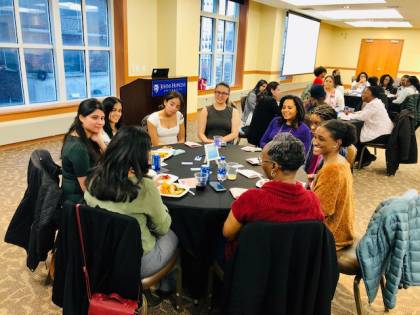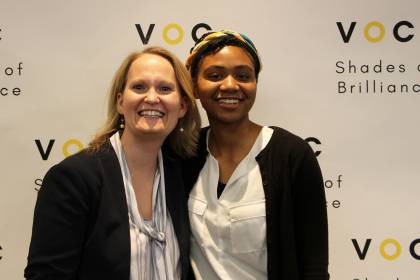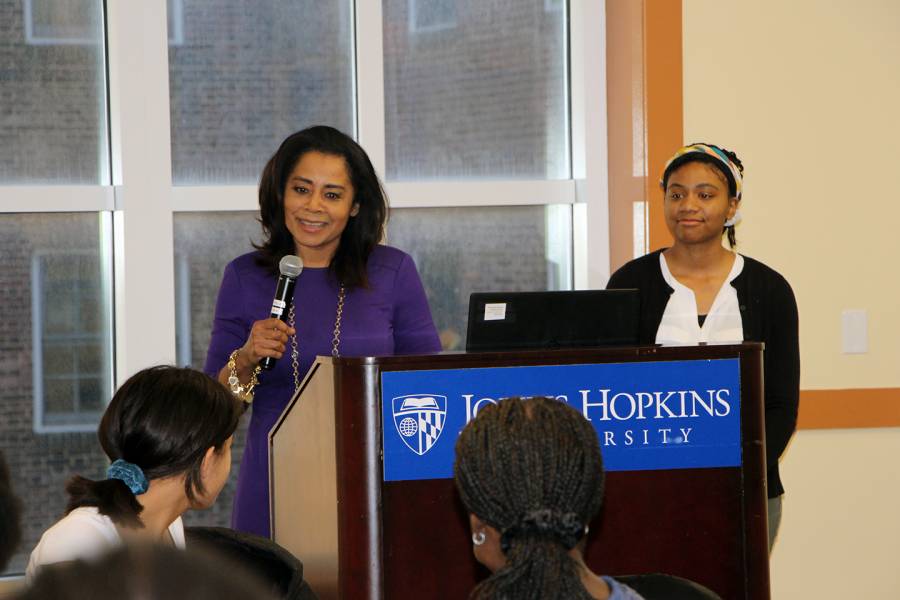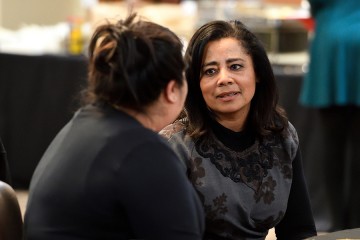"Take a deep breath, and as you breathe, notice the way your breath feels in your body," the woman intoned into the microphone. Around the room, a crowd of more than 50 women closed their eyes and rested their palms on their knees.
"Notice your breath as it travels through your nose, down your throat, and into your lungs. And as you breathe, feel the muscles in your shoulders relax. Feel the muscles in your face relax. Your hands…"
The sound of breathing. At Table One, a softening expression. At Table Six, a contented smile.

Image credit: Jeanine Heynes / Office of Women and Gender Resources
Most university conferences don't begin with a 10-minute guided meditation. But the Voices of Color event held Wednesday in the Charles Commons banquet room on Johns Hopkins University's Homewood campus wasn't like most conferences.
Organized by a team of undergraduate women and spearheaded by neuroscience major Maya Foster, Voices of Color brought together faculty, staff, and current and former Johns Hopkins students who identify as women of color for an evening of community building centered around the theme of mental health and wellness.
The meditation, guided by graduate student Pooja Deshpande, set the tone for an exploration of the many ways underrepresented minority students manage their physical, emotional, and spiritual well-being.
"If your mind's distracted, if you're suffering, or if you're consumed with negative thoughts, it detracts from your academic and personal growth," said Foster. "As women of color, we experience the burden of misogyny, as well as the burden of institutionalized racism. We experience these preconceived notions of who we are and who we can be. Speaking from personal experience, having that in your mind can be really destructive. So we're coming together to remind each other of our importance as individuals."
The idea for a conference for women of color at Hopkins was hatched in late 2017, when Foster approached alumna and university trustee Renee Chenault-Fattah with an idea to bring together students and alumnae for a networking event. The inaugural Voices of Color event, held last March, attracted roughly 70 students and alumnae.
This follow-up event—co-hosted by the Female Leaders of Color and co-sponsored by the Office of Women and Gender Resources, the Office of Multicultural Affairs, and Alumni Relations—gave participants the space to discuss their experiences with mental health and their strategies for promoting wellness and resilience.

Image caption: Jeannine Heynes (left), director of Women and Gender Resources, helped Foster (right) to organize the event.
Image credit: Nicole Muehleisen
"Mental health can look very different for different communities," said junior Nya Jones, an economics and public health major. "Having this discussion among women of color is important because we can relate based on our shared experiences."
The guided meditation was followed by a series of talks. Margia A. Argüello, an alumna of both the Krieger School of Arts and Sciences and the Carey Business School, shared lessons she learned while working as a health worker in rural parts of Africa. Citing Marie Kondo, an organizing guru of recent international fame, Argüello advised students to shed the things that do not "spark joy" in their lives.
Chenault-Fattah, whose daughter is a sophomore at Hopkins, discussed the importance of building relationships in college, and of finding a fulfilling pastime. Hers, she said, is meditating, although she acknowledged that she may not be doing it correctly.
"But whether I do it right or I do it wrong, I do it for myself," she said.
Smita Ruzicka, dean of student life, discussed the expectations she felt throughout her life as a daughter, a wife, a mother, and a professional, and how the pressure of those expectations affected her career choices.
"I became a therapist for communities of color because so many times in our communities, we didn't talk about mental health. It was deeply personal work for me," she said. "And when I decided to switch careers and start working with students, I once again thought about my own experiences as an international student. … I work with students who on an everyday level have these internal messages about what's expected of them, and when they're not able to meet those expectations, they are in pain. And that is painful. If I can create a counternarrative to those messages they're hearing, I can take away some of that pain."
Following the talks, participants broke out into roundtable discussions centered on identifying tools for stress management. Seating was arranged so each table would include students, alumnae, faculty, and staff members, in order for all perspectives to be shared.
"It's important for women of color to connect with one another and to have a space to come together and hear other peoples' stories," Ruzicka said. "For underrepresented student communities as well as underrepresented faculty and staff, there is a double pressure not just to perform but to excel, and vulnerability is often not an option. Having a safe space to talk about our lived experiences is really crucial."
Posted in Health, Student Life
Tagged mental health, race, gender, voices of color









